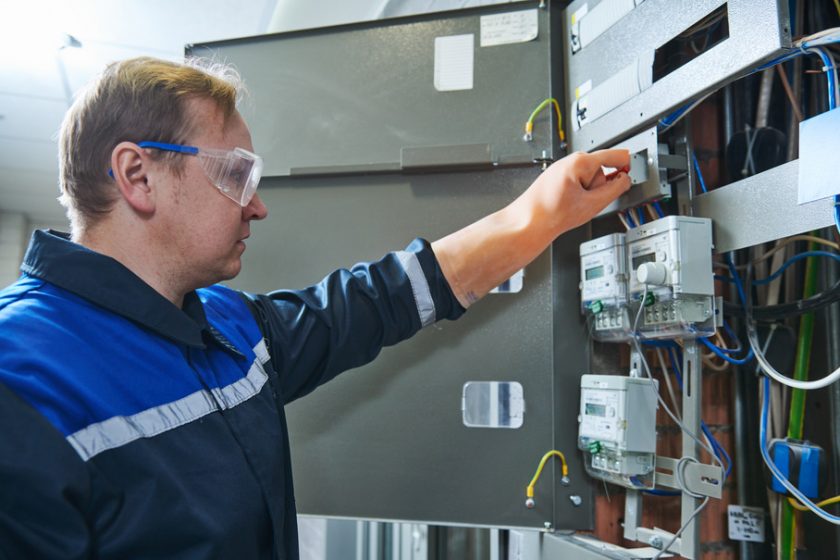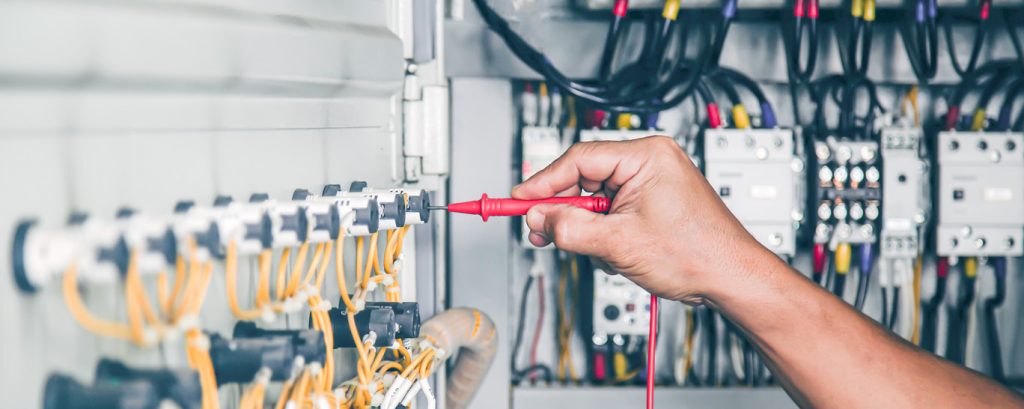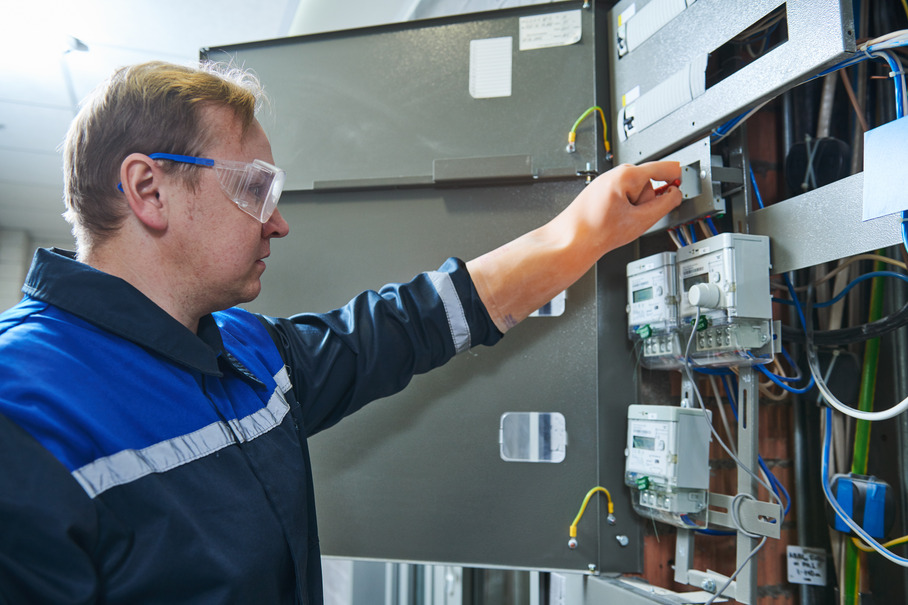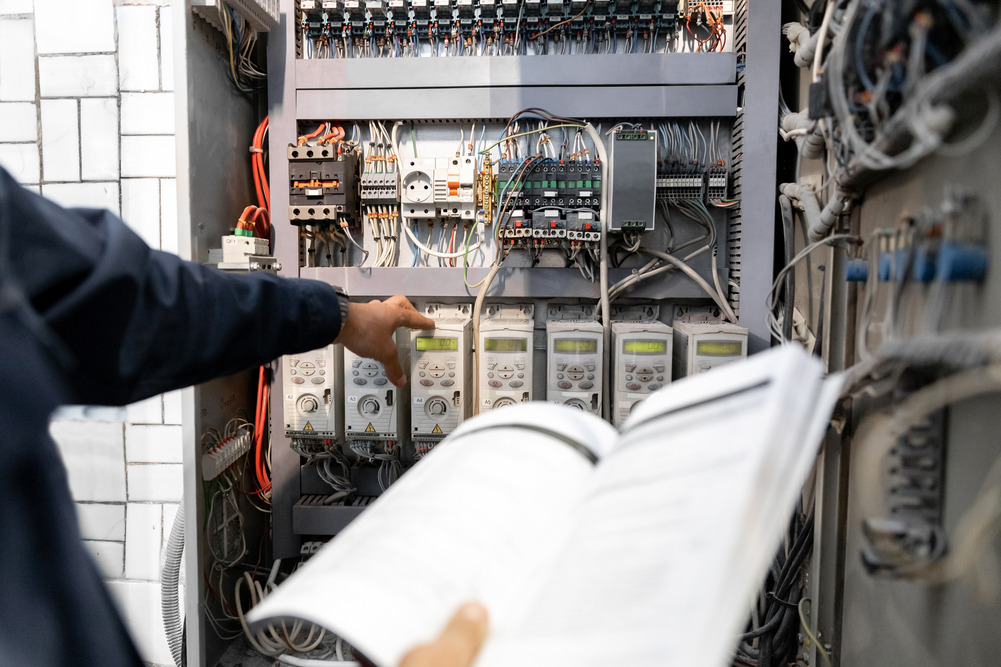
Adelaide Commercial Electrician Services
Why would I need a Commercial Electrician?
For starters, let’s run through the differences between Commercial, Industrial, and Residential Electricians. All of them begin with similar knowledge and skills (how to install and repair electrical systems). All must read documents like schematics, blueprints, and technical drawings, analyse problems and follow logical paths to solutions. You will also find most of them climbing ladders and working at awkward angles in crawl spaces. However, as they gain more experience in their specialty, the three kinds of electricians can become quite different creatures.

Residential Electricians
These most familiar electricians can be found roving across the suburbs in their branded vans. They can fix the wiring in your house when something stops working or install new wiring in your walls when you decide to upgrade or extend your house in some way.
Industrial Electricians
Hidden away from the public inside factories, scientific research labs, power companies, mining operations, construction sites, warehouses, shipyards, and smelters, Industrial Electricians ply their trade. They deal with more complex systems at both higher and lower voltage levels than are found in homes. They may extend their skills into advanced motor control, robotics, sensor fault finding, or machinery production lines.
Commercial Electricians
These electricians bridge the gap between the Residential and Industrial kinds. They perform similar duties to Residential Electricians but are more likely to work at heights and on larger and more complex systems over longer periods. You will find them servicing buildings like shopping malls, hospitals, hotels, retail stores, office blocks, garages, restaurants, and the like. In these places, they might carry out the following kinds of work:
Service and Repair
If you own a commercial building, you should call a commercial electrician when a storm takes out your power, there is water damage, some kind of mysterious power surge is playing havoc with your machines, or you find exposed wiring. Call for regular maintenance and testing too – that way, when disaster strikes, you will be able to have an electrician a phone call away who is already familiar with your infrastructure and systems, saving you time and money.

Analysis
Whether they have turned up to fix a fault or install a new system, Commercial Electricians will need to analyse the existing system. In commercial buildings, electrical systems are significantly more complex than residential ones, so it saves time if your electrician already knows your system and is experienced with others like it. This experience is then used to:
-
- Troubleshoot and rectify wiring problems.
- Design and specify new or upgraded systems – for example, there has been an increased need for data centres and warehousing as retailing shifts online.
- Complete energy audits to investigate energy efficiency.
- Re-design spaces to deal with social distancing rules that pushed workstations further apart.
Installation
A current trend in commercial buildings is for more safety and efficiency through automation. Sometimes called the ‘Internet of Things’ (IoT), there is a move toward installing physical objects with sensors and processing ability or software that requires an internet connection. For safety, this may mean that emergency lighting or an Uninterruptable Power Supply (UPS) kicks in when the power goes out or when low light is detected. For efficiency, this may mean sensors that keep track of how many people are occupying a building, how hot or cold it is, and how long it has been since movement was detected in a room. That way, lighting and air conditioning can be adjusted to turn off or reduce output when it is not needed. Of course, some of this can be done more simply (e.g., lights on timers) depending on what you need, and there is still a brisk trade in the basics of installing light switches and light fittings in high places.
Subcontracting
If you are considering sub-contracting, congratulations on having more work than you can manage yourself. This is nothing but good news if you can fall back on an existing relationship with a dependable subcontractor. This gives you the help you need when you want it, without the extra costs and legal obligations of hiring more staff yourself. Even with a higher hourly rate, this works out cheaper than hiring – which is why subcontracting is so common. You can also get specialised expertise that you may not normally need on your own team. The fact that you don’t know the ‘subbie’ as well as your own staff is no great problem when you subcontract to an established firm with a proven record for professional standards.

Do Commercial Electricians need special qualifications?
Working with electricity is dangerous so the trade is heavily regulated by local, state, and national guidelines. All electricians must be licensed. In South Australia this means they must:
- Hold a valid electrical or builder’s license to contract for electrical work. If they hold a builder’s license, they are allowed to complete other work besides electrical wiring e.g., building construction. The highest form of license, granting permission to complete all kinds of electrical work and to sign off on the work of others is an A Class license. B Class license holders would be able to complete the same work but only under the supervision of an A Class license holder. Other kinds of license may be limited to certain kinds of work, e.g. just connecting and disconnecting fixed wired appliances under 1000 volts, or just Refrigeration and Airconditioning work.
- Electricians must make their license number readily available to the public by including it on their business cards, website, and advertising.
- Electricians must be registered to conduct electrical work in South Australia. Customers can make sure their electrician has the relevant license by going to www.secure.cbs.sa.gov.au/OccLicPubReg/index.php and looking up the electrician’s name or trading name on the register.
- Electricians must certify the work they complete to declare that it complies with local, state, and national guidelines and email or post the certificate to the customer with an Electrical Certificate of Compliance (eCoC).
- They may also provide a warranty that the work completed, materials used, and time taken to complete the work meets trade standards and legal requirements, with a copy of this also to be given to the customer. A lot of people don’t know this, but in the case of something breaking down within the warranty, the manufacturer may ask if it was installed correctly by a correctly licensed electrician – so a specific warrantee certificate would need to be issued and kept by the customer.
Generally, electricians gain their qualifications by completing an apprenticeship with an experienced electrician or builder while also studying a 4-year TAFE certification such as Certificate III in Electrotechnology Electrician. Once their apprenticeship is complete and they have gained their certificate, they apply for their electrical license, which allows them to work unsupervised. They may also complete additional training for working at heights, in confined spaces, with data and voice communications, or in hazardous areas like construction sites.
Trust CMA with your Commercial Electricity Needs
At CMA, all our electricians hold A Class licenses and our team is highly experienced with complex commercial projects. We know that commercial buildings are expensive and that can make building and maintaining them stressful. We have enough experience in working on large commercial projects to have honed our administrative support processes so that things run smoothly and we can anticipate problems.
We understand the importance of a consultative approach so that our team and the customer are clear on the parameters we need to work in, the budget specified, and the primary purpose of the build. In other words, we don’t just come in and fix or install the lights. We take your building and business into consideration as a system and let you know what might be on the horizon, so we can help you plan strategically for the future. You can also trust us for a quick response and reliable service – we want to work with you long-term. Find out more about CMA Electrical – Commercial Electricians here.


